I'm running a simple scanner to parse a string, however I've discovered that if called often enough I get OutOfMemory errors. This code is called as part of the constructor of an object that is built repeatedly for an array of strings :
Edit: Here's the constructor for more infos; not much more happening outside of the try-catch regarding the Scanner
public Header(String headerText) {
char[] charArr;
charArr = headerText.toCharArray();
// Check that all characters are printable characters
if (charArr.length > 0 && !commonMethods.isPrint(charArr)) {
throw new IllegalArgumentException(headerText);
}
// Check for header suffix
Scanner sc = new Scanner(headerText);
MatchResult res;
try {
sc.findInLine("(\\D*[a-zA-Z]+)(\\d*)(\\D*)");
res = sc.match();
} finally {
sc.close();
}
if (res.group(1) == null || res.group(1).isEmpty()) {
throw new IllegalArgumentException("Missing header keyword found"); // Empty header to store
} else {
mnemonic = res.group(1).toLowerCase(); // Store header
}
if (res.group(2) == null || res.group(2).isEmpty()) {
suffix = -1;
} else {
try {
suffix = Integer.parseInt(res.group(2)); // Store suffix if it exists
} catch (NumberFormatException e) {
throw new NumberFormatException(headerText);
}
}
if (res.group(3) == null || res.group(3).isEmpty()) {
isQuery= false;
} else {
if (res.group(3).equals("?")) {
isQuery = true;
} else {
throw new IllegalArgumentException(headerText);
}
}
// If command was of the form *ABC, reject suffixes and prefixes
if (mnemonic.contains("*")
&& suffix != -1) {
throw new IllegalArgumentException(headerText);
}
}
A profiler memory snapshot shows the read(Char) method of Scanner.findInLine() to be allocated massive amounts of memory during operation as a I scan through a few hundred thousands strings; after a few seconds it already is allocated over 38MB.

I would think that calling close() on the scanner after using it in the constructor would flag the old object to be cleared by the GC, but somehow it remains and the read method accumulates gigabytes of data before filling the heap.
Can anybody point me in the right direction?